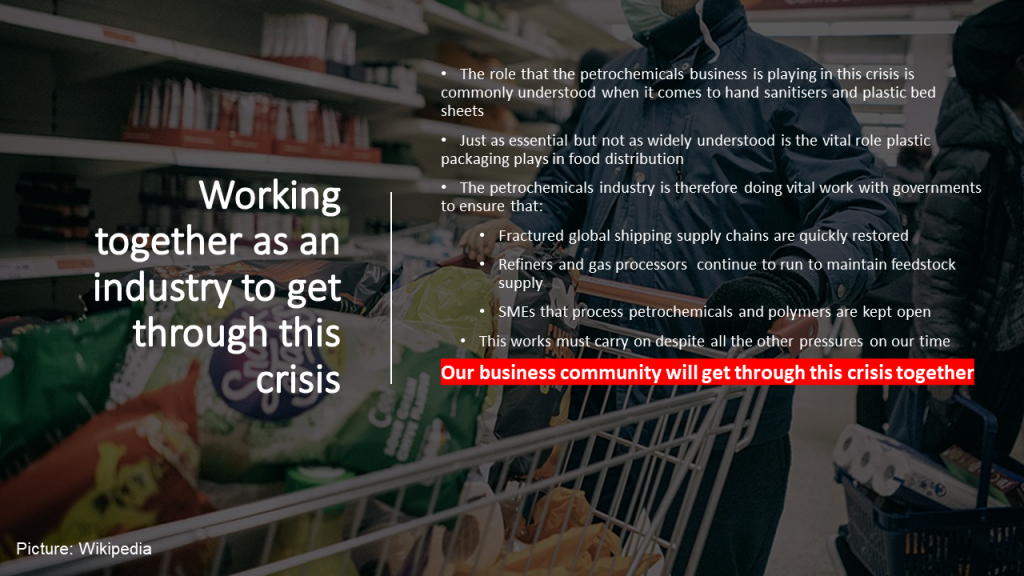
By John Richardson
INDUSTRY associations around the world are lobbying governments about the importance of the petrochemical industry for vital services beyond just the obvious production of hygiene products, face masks, pill bottles and disposable plastic bed sheets etc.
This vital work needs to continue as the petrochemicals business is not fully understood by many people, including perhaps some politicians. Take the food packaging business as a good example. You cannot maintain food deliveries unless you have the polymers available to make the films, the bottles and the rigid containers etc. to package the food.
There is a real risk that ports in many countries will shut down because of a lack of customs officers and dockers who will be under quarantine. In fact, it is already happening in countries such as India. So many containers are in the wrong positions, sometimes congesting ports and at other times not being available at all to make important journeys, that critical deliveries are being jeopardised.
PE, PP and PET resins to make food packaging are not the only examples that may not be fully understood by legislators. Think of PVC resins for sewerage and water pipes. Sewerage and water-pipe systems must be maintained. What if a country that requires imports of PVC resins needs to build emergency hospitals? Having the isopropanol to make the hand sanitiser is one thing, but the hospital will also need sewerage and water pipes.
This is where we are today. We are on a wartime footing where measures that seemed inconceivable just two weeks ago have now become essential. The ports must eventually return to normal. Governments must ensure that there enough truckers to deliver supplies to ports and enough dockers and customs officers to handle cargoes. Containers need to be moved to the right locations.
Consider it this way. Firefighters still go into buildings when they are on fire otherwise they wouldn’t be firefighters. Now the truckers who deliver polymer resins and other critical supplies to ports have in effect become firefighters, as have the dockers and the customs officers.
Let’s put this into perspective. With the right protective gear – again made from polymers – and the right hand-washing routines (isopropanol again), going into a port where there have been COVID-19 infections is a great deal less dangerous than going into a burning building
But will so many people end up being sick that there are simply not enough truckers, dockers and customs officers available? Not every country has a well-functioning government. Some countries in very poor parts of the world don’t really have governments at all.
Too alarmist? I am afraid not. This is the world in which we live, and we simply must get used to it. Ocean and sea-based supply chains in some parts of the world are at risk of remaining dysfunctional for a long time.
Air freight might then be answer. As we all know, airlines are desperately short of business. Flying in vital supplies could be a way of both keeping supply chains open and supporting the airline industry – in extremis, for the countries where government and industry cannot work together to keep the ports open. Also think of landlocked countries such as Ethiopia.
Some petrochemicals companies might need to even be run as utilities for the time being with support from governments to ensure that supply chains work to enable then to operate. It is not just shipping that’ a challenged. Enough feedstock must be available to keep crackers and reformers running. Upstream refiners and gas processors will require support so that they maintain operations as transportation and energy demand continues to weaken.
And as we know, hundreds of thousands of SMEs, including plastic processors and converters, are at risk of going out of business. Even more government rescue packages and/or market targeted rescue packages could be necessary. If there are not enough processors the petrochemicals industry won’t be able to operate.
If the energy and petrochemicals industry work through the industry associations who are so fantastically useful at times like this – and work directly with legislators to support the work of the associations – we can get through this together.
Let’s finish on a positive note as we need to stay positive: This will happen. The energy and petrochemicals industries are populated by some incredibly bright, capable and hardworking people. Together, we can make this happen.
